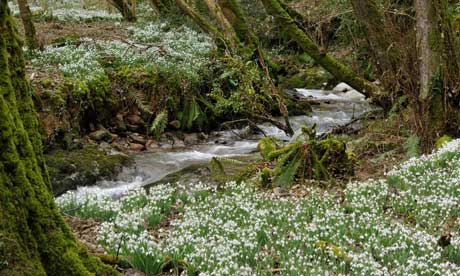World on course to run out of water, warns Ban Ki-moon
Freshwater supply and water quality under pressure, warns UN secretary general on International Day of Biological Diversity
-
John Parnell for RTCC, part of the Guardian Environment Network
- guardian.co.uk, Wednesday 22 May 2013 12.20 BST
- Jump to comments (17)

Ban Ki-moon has warned the world is on course to run out of freshwater unless greater efforts are made to improve water security.
Speaking on the UN’s International Day of Biological Diversity, Ban said there was a “mutually reinforcing” relationship between biodiversity and water that should be harnessed.
“We live in an increasingly water insecure world where demand often outstrips supply and where water quality often fails to meet minimum standards. Under current trends, future demands for water will not be met,” Ban said.
Water, food, energy and climate are all linked.
Most forms of energy generation require water, variable weather is making agriculture harder while extreme weather events are hindering natural water storage.
Ban believes there is an opportunity to address these challenges as the Millennium Development Goals are replaced with a new set of objectives.
“As the international community strives to accelerate its efforts to achieve the Millennium Development Goals and define a post-2015 agenda, including a set of goals for sustainable development, water and biodiversity are important streams in the discussion.
“Although seemingly abundant, only a tiny amount of the water on our planet is easily available as freshwater,” he said.
The latest UN World Water Development Report, released last year, called for $13.7bn to $19.2bn of the Green Climate Fund’s annual targeted funding of $100bn to be directed at the challenges faced by the water sector.
Much of this would be used to tackle supply shortfalls and flood management.
Climate change is already impacting the availability of water through rainfall disruption, soil moisture, glacier, snow and ice melt and river, ground and water flows.
Ban said the once competing campaigns for water and biodiversity protection could now be turned to the benefit of societies facing stresses on both water and food security.
“Where once the focus was on trade-offs between water use and biodiversity, today we are coming to understand how biodiversity and water security are mutually reinforcing,” he said.
“Ecosystems influence the local, regional and global availability and quality of water. Forests help regulate soil erosion and protect water quality and supply. Wetlands can reduce flood risks. Soil biodiversity helps maintain water for crops.
“Integrating nature-based solutions into urban planning can also help us build better water futures for cities, where water stresses may be especially acute given the rapid pace of urbanization.”
